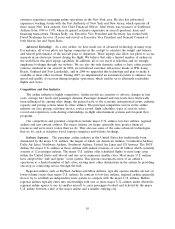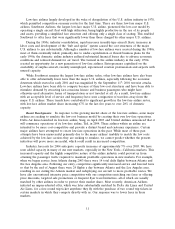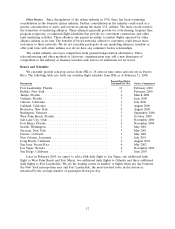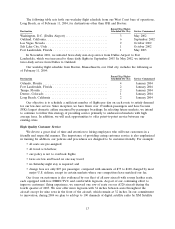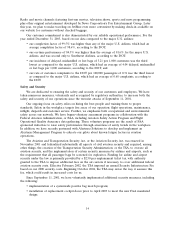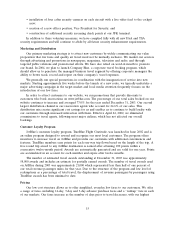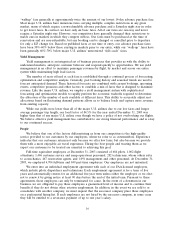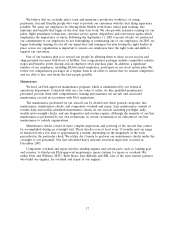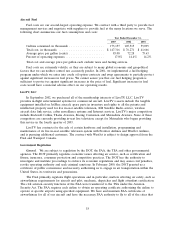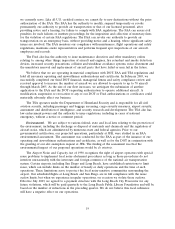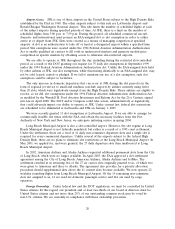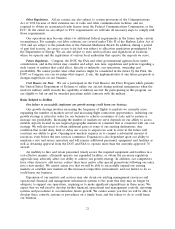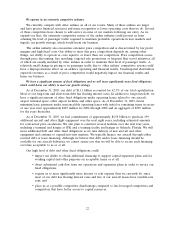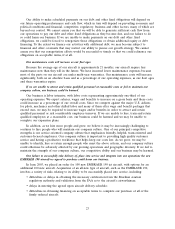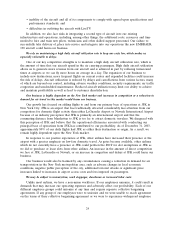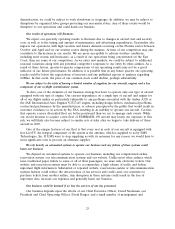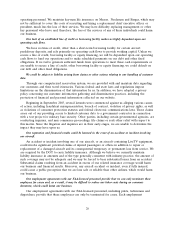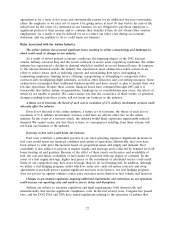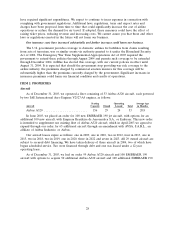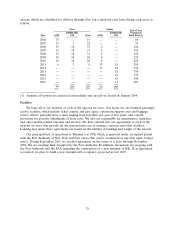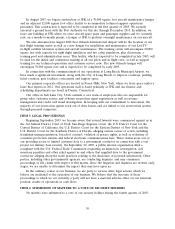JetBlue Airlines 2003 Annual Report Download - page 23
Download and view the complete annual report
Please find page 23 of the 2003 JetBlue Airlines annual report below. You can navigate through the pages in the report by either clicking on the pages listed below, or by using the keyword search tool below to find specific information within the annual report.Airport Access. JFK is one of three airports in the United States subject to the High Density Rule
established by the FAA in 1968. The other airports subject to this rule are LaGuardia Airport and
Ronald Reagan Washington National Airport. This rule limits the number of scheduled flights at each
of the subject airports during specified periods of time. At JFK, there is a limit on the number of
scheduled flights from 3:00 p.m. to 7:59 p.m. During this period, all scheduled commercial aircraft,
domestic and international, must possess an FAA-assigned slot or slot exemption in order to either
arrive at or depart from JFK. Slots were created as a means of managing congestion at specified
airports. A slot is an authorization to take off or land at a designated airport within a specified time
period. Slot exemptions were created under the 1994 Federal Aviation Administration Authorization
Act to enable qualified air carriers to fill voids in underserved markets and generate needed price
competition in specific markets by obtaining access to otherwise slot-restricted airports.
We are able to operate at JFK throughout the day, including during the restricted slot-controlled
period, as a result of the DOT granting our request for 75 daily slot exemptions in September 1999
under the 1994 Federal Aviation Administration Authorization Act. Unlike the FAA-assigned slots held
by other airlines at JFK, our slot exemptions, while functioning identically to an FAA-assigned slot, may
not be sold, leased, rented or pledged. If we fail to maintain our use of a slot exemption, such slot
exemption could be subject to forfeiture.
The only increase in domestic departures that can occur at JFK during the slot period is in the
form of regional jet service to small and medium, non-hub airports by airlines currently using fewer
than 20 slots, which were legislatively exempt from the High Density Rule. These airlines are eligible to
receive, as we did, slot exemptions under the 1994 Federal Aviation Administration Authorization Act,
as modified by the Wendell H. Ford Aviation Investment and Reform Act for the 21st Century, signed
into law in April 2000. The DOT and/or Congress could take action, administratively or legislatively,
that could adversely impact our ability to operate at JFK. Under current law, federal slot restrictions
are scheduled to be eliminated at LaGuardia and JFK on January 1, 2007.
We were recently granted 11 slot exemptions at LaGuardia Airport. If we are able to arrange for
commercially feasible slot times with the FAA and obtain the necessary facilities from the Port
Authority of New York and New Jersey, we anticipate initiating service in spring 2004.
Long Beach Municipal Airport is also a slot-controlled airport. However, the slot regime at Long
Beach Municipal Airport is not federally mandated, but rather is a result of a 1995 court settlement.
Under the settlement, there are a total of 41 daily non-commuter departure slots and a single slot is
required for every commercial departure. Unlike several of the airports subject to the federal High
Density Rule, there are no plans to eliminate slot restrictions at the Long Beach Municipal Airport. In
May 2001, we applied for, and were granted, the 27 daily departure slots then unallocated at Long
Beach Municipal Airport.
In 2002, American Airlines and Alaska Airlines requested additional permanent slots from the City
of Long Beach, which were no longer available. In April 2003, the FAA approved a slot settlement
agreement among the City of Long Beach, American Airlines, Alaska Airlines and JetBlue. The
settlement resulted in us returning five of the 27 air carrier slots originally granted to us, of which two
were given to American and three to Alaska. The agreement also provides for a priority allocation
procedure should supplemental slots above the 41 current slots become available. We now operate 22
weekday roundtrip flights from Long Beach Municipal Airport. Of the 19 remaining non-commuter
slots not assigned to us, 14 are used for domestic passenger service and five are used by cargo
operators.
Foreign Ownership. Under federal law and the DOT regulations, we must be controlled by United
States citizens. In this regard, our president and at least two-thirds of our board of directors must be
United States citizens and not more than 25% of our outstanding common stock may be voted by
non-U.S. citizens. We are currently in compliance with these ownership provisions.
20


